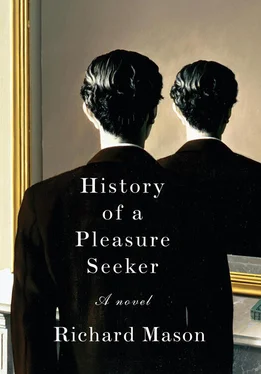“I expect she’s dressing, Papa.”
“Well, hurry her along.”
Constance left, and when she returned it was clear to Piet that she was annoyed. “She’s not well, Papa, and asks to be excused. She sends her compliments, Mr. Barol.”
“Not well? She was in radiant health this morning.” Maarten had drunk two glasses of champagne, and Louisa’s absence poisoned the gaiety they had fueled. “Fetch her down.”
“It would be better to leave her.”
“Nonsense. Fetch her down.”
She is embarrassed to face me, thought Piet. The idea was not wholly unpleasant. He thought of the many nasty things he had overheard Louisa Vermeulen-Sickerts say to her sister about him, and then about the day she had tried to break his neck on her mother’s horse. To have refused her, and done it kindly, was magnificent. “Please, sir. If she’s not well …”
“You are good-natured as ever, Mr. Barol. But I won’t stand for prolonged sulks. Constance, fetch her down.”
Constance was gone longer this time and Maarten drank another glass of champagne. Again she returned without her sister. “Really, Papa, she has a fever. She should have some soup and go to bed.”
“She was perfectly well this morning, was she not, my dear?” But Maarten did not wait for his wife’s reply. “I am afraid, Mr. Barol, that my daughter is displeased with me and chooses to make her displeasure plain on this happy night. Well it will not do.” He went to the foot of the stairs and bellowed her name.
Louisa appeared a few minutes later, wearing a monk’s habit of oyster cashmere with a cowl over her dark hair. “You sent for me, Papa?”
“Whatever do you mean by this?”
“By what?”
“Our guests will arrive at any moment. You are not dressed to receive them.”
“You did not instruct me to dress. You merely called my name so loudly I thought some grave crisis had overtaken you.”
It was a long time since anyone had been insolent to Maarten Vermeulen-Sickerts. It enraged him. “Go upstairs at once and change.”
Louisa wished strenuously to disobey her father, but a strict and careful upbringing had left her without the necessary courage. Seeing her hesitate, the idea of being magnanimous was irresistible to Piet. “No harsh words on my account, sir. If Miss Vermeulen-Sickerts wishes—”
“Very well, Papa.” Louisa did not intend to owe her solitude to Piet Barol. She turned on her heel and left the room and despised herself.
The doorbell rang and the first guests were announced. Among them, to Constance’s relief, was her friend Myrthe Janssen (shortly to be van Sigelen), who could always be relied on to cheer people up. Soon laughter and high, excited talk were bouncing off the room’s stone walls, and the family recaptured its spontaneity.
Louisa came downstairs, inscrutable once more, and they went into dinner. The table had been opened to its fullest extent and Maarten had sanctioned the use of the Sèvres porcelain. Piet was directly opposite Frederik van Sigelen. It amused him to see that this ungenerous young man could not for the life of him fathom why anyone should go to such trouble for a servant. This heightened his pleasure at the saumon Dorne Valois , baked in lobster butter and decorated with coquilles of oysters. As the poached purée of Bordeaux pigeon was served, he remarked that he would shortly be sailing on the Eugénie . “I remembered your ardent recommendation.”
“I’m sure even steerage is more comfortable than on other ships.”
Myrthe Janssen looked at her plate. She was already beginning to dislike her fiancé, whose malice made her uneasy for her own future. “How thrilling to be going to New York,” she said, lightly.
“My destination is Cape Town, in fact, Miss Janssen. The ship is making a special voyage.”
“But I know all about it.” Myrthe laughed the merry laugh she was known for. “Frederik’s parents are going too, aren’t they darling?”
“I believe they were invited. Albert Verignan, who owns the line, is a personal friend. But my father cannot be away from Amsterdam so long.”
“Oh Mr. Barol, what fun you’ll have. I’m told there’s to be a fancy dress ball on St. Helena.”
“Only for the first-class passengers.” Van Sigelen tapped his glass and a footman bent to refill it.
“My means don’t extend so far.” Piet smiled. “I was fortunate to get the last berth in tourist.”
Frederik saw Myrthe’s warning look and forbore from asking Piet where he had got the money. “I’m sure it will be worth every centime.”
“If it’s not, I shall have you to blame.”
As she left the table after the last course, Constance whispered, “Join us soon, Papa.” And after the port had gone round once the assembled men surged up the stairs. In the drawing room Piet was presented with his trunk and made a witty and affectionate speech of thanks, which was met by a request from Maarten for “one last song at the piano, Mr. Barol.”
“Something jolly!” called one of the young men, who had inveigled himself onto the sofa beside Constance.
“A song of farewell,” said Myrthe Janssen.
Piet bowed. “Figaro’s farewell to Cherubino, then, from the Marriage of Figaro .” He struck it up merrily. Everyone knew the tune and there was much thumping of feet. “No more, you amorous butterfly, will you flutter around night and day,” Piet sang, “disturbing the peace of every beautiful woman.” The words made him think of himself, for he had conquered Jacobina, and resisted Constance, and provoked from Louisa a proposal of marriage.
His performance was met with rounds of applause and calls for an encore. He resisted modestly but at length allowed them to persuade him. “This was a huge hit in Rome a few years ago. If you want a farewell scene I can’t think of one more moving. A man is in his cell, awaiting execution. This is the letter he writes his lover, a dazzling beauty named Tosca.” He played a sprinkle of notes, feeling pleasantly invincible, and at once the atmosphere altered. Those watching were seized by a glorious, uplifting sorrow. “Oh! sweet kisses, oh! languid caresses!” Piet sang, and for a moment in the crowded room his eyes met Jacobina’s, and they said good-bye.
Louisa saw them. She blinked and looked again. Piet was now concentrating on the piano and her mother had turned to a friend. All was as it should have been. Louisa accepted a cup of coffee from Hilde and tried to turn her mind to her own troubles, but certain facts abruptly forged a hazardous whole: an ugly dress, a potent smell, a green button lying on a blue carpet.
She said nothing as the guests began to take their leave and did not join her parents and Constance and Piet as they saw them off downstairs. As soon as she was alone she went into her mother’s dressing room and opened her closets. The little green button had been fretting at the limits of her other sorrows; now she was sure she knew the dress it had come from. If the garment was undamaged she would know she was wrong.
But the gown of apple-green wool was not in the wardrobe. Nor was it in the laundry or the sewing basket. Louisa had a couturier’s natural inventory for clothes and traced her way through a fortnight of her mother’s discarded garments. Everything was there, either cleaned or about to be, but not the apple-green dress she had worn the day Constance and Egbert and her father went to the country. She bit her knuckle. Surely that was the day her mother had appeared in a hideous mauve concoction. This was in her wardrobe. She took it out. It was not at all Jacobina’s size. When she put her nose between the ruffles of its neck she was met by the unmistakable smell of her great-aunt Agaat. Why should her mother wear her great-aunt’s clothes? And why should she have damaged her own dress, apparently beyond repair, in Aunt Agaat’s bedroom?
Читать дальше












